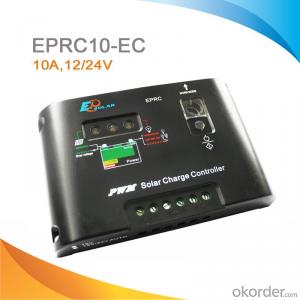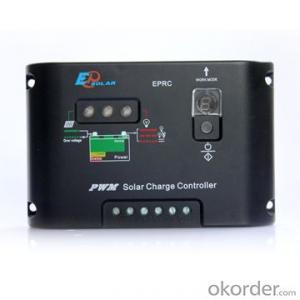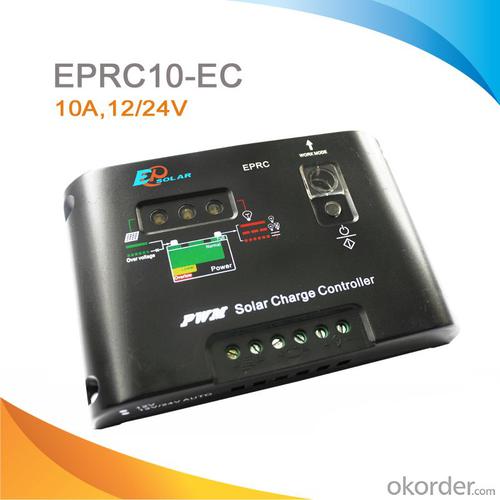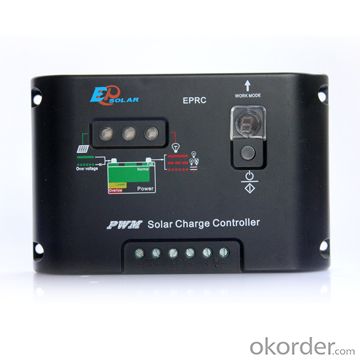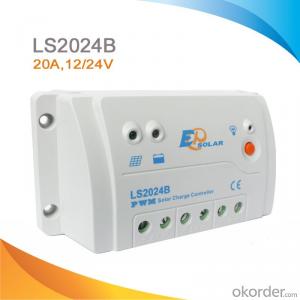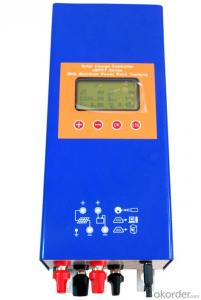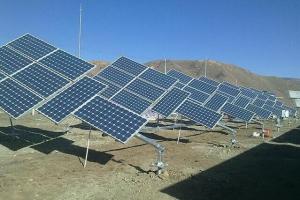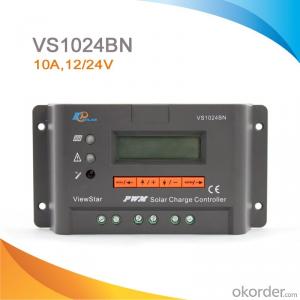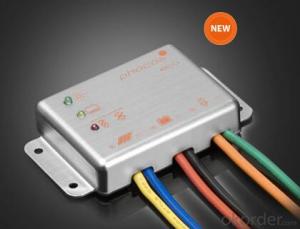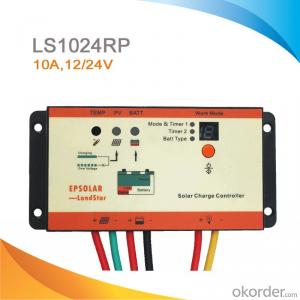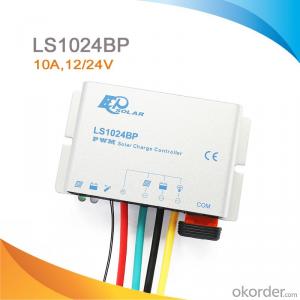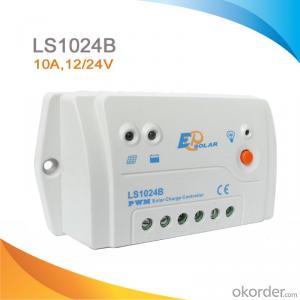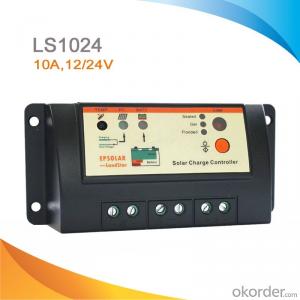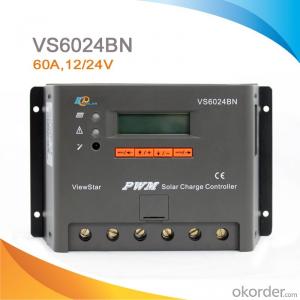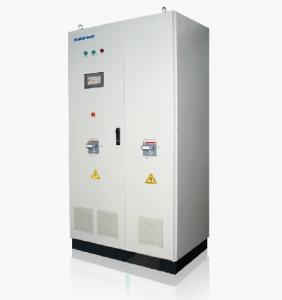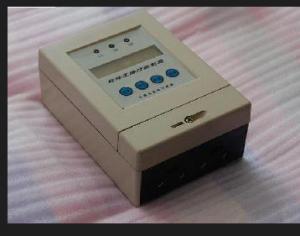Solar Street Light Controller,10A,12/24V,EPRC10-EC
- Loading Port:
- Tianjin
- Payment Terms:
- TT or LC
- Min Order Qty:
- -
- Supply Capability:
- 10000 pc/month
OKorder Service Pledge
OKorder Financial Service
You Might Also Like
EPRC10-EC series solar controller is a reliable and economical solar controller.
Dusk to Dawn, Light ON+ timer, TEST, ON/OFF
Features:
·Intelligent System Optimum Control
·12/24V auto work
·High efficient Series PWM charging with temperature compensation
·Use MOSFET as electronic switch, without any mechanical switch
·Load and battery status indicators
·Electronic protection: over charging, over discharging, overload, and short circuit
·Diversified load control modes : Manual, Light ON/OFF, Light ON+ Timer, Time Control
·Battery type selection: Gel, sealed, flooded and User type
·Real-time monitor
·Programmable parameters
·LVD or SOC load disconnect function
·Energy statistics function
Electronic Protections:
·PV short circuit
·PV reverse polarity
·Battery overcharge
·Battery over discharge
·Battery reverse polarity
·Load short circuit
·Load overload
·Overheating
Specification:
Electrical parameters | |
System voltage | 12 / 24VDC Auto work |
Nominal battery current | 10A |
Charge circuit voltage drop | ≤0.26V |
Discharge circuit voltage drop | ≤0.15V |
Self consumption | ≤6mA |
Equalize charging voltage | 14.6V;x2/24V |
Boost charging voltage | 14.4V;x2/24V |
Float charging voltage | 13.6V;x2/24V |
Low voltage reconnect charging voltage | 12.6V;x2/24V |
Under voltage warning voltage | 12V; x2/24V |
Low voltage disconnect voltage | 11.1V;x2/24V |
Equalize duration | 60 MINS |
Boost duration | 60 MINS |
Working temperature | -35℃ to +55℃ |
Humidity | 10%-90% NC |
Enclosure | IP30 |
Terminal | 2.5mm2 |
Net weight | 0.23kg |
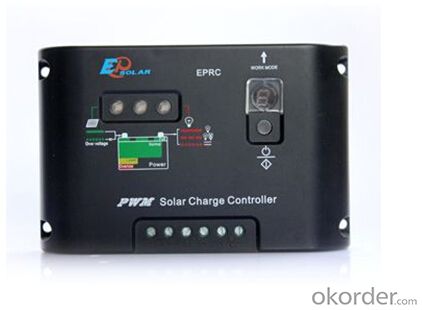
FAQ:
Q1. What is the voltage?
A1. Our 45/60A solar charge controller is 12/24/36/48V auto work.
Q2. What is the difference between MPPT&PWM?
A2. MPPT has higher efficiency, it can track the max power point and won't waste energy.
Q3. What is the efficiency of the MPPT controller?
A3. MPPT>99%, peak conversion efficiency>98%.
Q4. What is the waranty of product?
A4. 12 months.
Q5. What protection does your MPPT controller have?
A5. PV array short circuit, PV reverse polarity, Battery reverse polarity, Over charging, Output short circuit.
- Q: Can a solar controller be used with solar-powered indoor hydroponics systems?
- Solar controllers can indeed be utilized in solar-powered indoor hydroponics systems. Their purpose is to regulate and manage the electricity flow from solar panels to connected devices or batteries. Within an indoor hydroponics system, solar controllers can effectively control the power supply from solar panels to lighting systems, water pumps, and other electrical components. Employing a solar controller guarantees efficient utilization and proper distribution of energy generated by the solar panels. This maintenance of optimal conditions ensures optimal plant growth within the hydroponics system.
- Q: Are there any disadvantages of using a solar controller?
- Yes, there are some disadvantages of using a solar controller. One major disadvantage is that solar controllers can be quite expensive to purchase and install. The cost of a solar controller can add to the overall cost of setting up a solar power system, which may be a deterrent for some individuals or businesses. Another disadvantage is that solar controllers can be quite complex to operate and maintain. They require proper programming and configuration to ensure optimal performance, and regular maintenance to keep them functioning efficiently. This may require technical expertise or the hiring of professionals, which can be an additional cost. In addition, solar controllers can have limited compatibility with certain solar panels or battery systems. It is important to ensure that the solar controller is compatible with the specific components of the solar power system, otherwise it may not function properly or could even cause damage. Lastly, solar controllers rely on sunlight to generate power, so they may not be as effective in areas with limited sunlight or during cloudy days. This can result in reduced energy production and may require alternative power sources or energy storage solutions. Overall, while solar controllers offer many benefits in terms of regulating and optimizing solar power systems, they do come with some disadvantages that need to be considered before making a decision.
- Q: How does a solar controller handle battery desulfation?
- A solar controller handles battery desulfation by periodically applying high voltage pulses to the battery, which helps break down and remove sulfation buildup on the battery plates. This process rejuvenates the battery and improves its overall performance and lifespan.
- Q: Can a solar controller be used with a solar-powered hydrogen production system?
- Yes, a solar controller can be used with a solar-powered hydrogen production system. The solar controller is responsible for regulating and optimizing the flow of electricity from the solar panels to the hydrogen production system, ensuring efficient and reliable operation.
- Q: Can a solar controller be used in a solar-powered medical equipment system?
- Yes, a solar controller can be used in a solar-powered medical equipment system. A solar controller regulates the flow of electricity from the solar panels to the equipment, ensuring optimal charging and preventing overcharging or damage to the batteries. It helps in maintaining a stable power supply, making it suitable for use in solar-powered medical equipment systems that require reliable and uninterrupted power.
- Q: Can a solar controller be used with a remote monitoring system?
- Yes, a solar controller can be used with a remote monitoring system. The solar controller can gather data on the solar panels' performance, power output, and battery status, which can then be transmitted to a remote monitoring system. This allows for real-time monitoring and analysis of the solar system's efficiency and enables remote troubleshooting and maintenance.
- Q: Can a solar controller be used with solar panels of different wattage?
- Yes, a solar controller can be used with solar panels of different wattage. The main function of a solar controller is to regulate and optimize the charging of batteries from solar panels. It does not rely on the wattage of the panels but rather on the voltage and current they generate. As long as the voltage and current output of the solar panels falls within the acceptable range supported by the solar controller, it can be used with panels of different wattage.
- Q: Are all solar controllers waterproof?
- No, not all solar controllers are waterproof. Some solar controllers are designed to be waterproof, while others may not be. It is important to check the specifications and features of a solar controller before purchasing to ensure that it is waterproof if that is a requirement for your specific needs.
- Q: Can a solar controller be used in a hybrid solar system?
- Yes, a solar controller can be used in a hybrid solar system. A solar controller is responsible for regulating the flow of electricity from the solar panels to the battery storage system. In a hybrid solar system, where there is a combination of solar panels and another source of energy like wind or grid power, the solar controller can still be used to manage the solar panel output and ensure optimal charging of the batteries.
- Q: How do I prevent undercharging of batteries with a solar controller?
- To avoid undercharging batteries when using a solar controller, there are several important measures you should take: 1. Choose the appropriate solar controller: It is crucial to select a solar charge controller that is specifically designed for your battery type. Different batteries have different charging requirements, and using an incompatible controller can lead to undercharging or overcharging. 2. Determine the correct size for your solar array: Ensure that the wattage of your solar panels is sufficient to fulfill the energy needs of your battery system. If the solar array is too small, it may not generate enough power to fully charge the batteries, resulting in undercharging. 3. Establish the proper charging parameters: Most solar charge controllers allow for adjustments to voltage set points and charging algorithms. Consult the manufacturer's instructions or user manual to identify the optimal settings for your battery type, and configure the controller accordingly. 4. Monitor battery voltage and state of charge: Regularly check the battery voltage and state of charge using a battery monitor or voltmeter. This will enable you to assess whether the batteries are being adequately charged. Consistently low voltage or lack of expected increases in state of charge may indicate undercharging. 5. Consider temperature compensation: Some solar controllers offer temperature compensation features, which adapt the charging parameters based on the ambient temperature. This can help prevent undercharging in extreme hot or cold conditions, as temperature can impact battery charging efficiency. 6. Regularly maintain and clean your solar panels: Keep your solar panels clean and free from debris to maximize their efficiency. Dust, dirt, or shading can diminish the amount of power generated, potentially leading to undercharging. By following these guidelines, you can significantly minimize the risk of undercharging your batteries with a solar controller, ensuring they receive the necessary charge for optimal performance and longevity.
Send your message to us
Solar Street Light Controller,10A,12/24V,EPRC10-EC
- Loading Port:
- Tianjin
- Payment Terms:
- TT or LC
- Min Order Qty:
- -
- Supply Capability:
- 10000 pc/month
OKorder Service Pledge
OKorder Financial Service
Similar products
Hot products
Hot Searches
Related keywords
